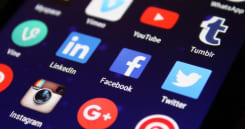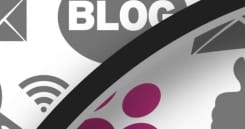The use of digital media has become increasingly common in daily life. For many, technology is essential for one’s job, with regular emails, conference calls, and information sharing being necessary. Others may view technology as a great way to connect to family and friends, nurturing these relationships even while physically separated. The advent of the COVID-19 era has further exacerbated these effects, ingratiating technology even more into daily personal and professional life. However, for those navigating their continued recovery, using digital media can be both beneficial and harmful. Managing one’s use of digital media is crucial throughout one’s recovery journey, from the first step into detox well into long-term sobriety.
The Dangers of Media Use in Recovery
There are many advantages to using digital media, even for those navigating their ongoing recovery. First, it is truly invaluable to have access to communicate with one’s family, sponsor, and other supports on demand. The use of sober-friendly apps on one’s phone, such as SoberGrid, can also be instrumental in developing a supportive online community while accessing recovery-focused information and resources.
However, while these benefits can be undoubtedly beneficial for maintaining one’s sobriety, the digital space also comes with several dangers. Digital media can also expose an individual to a myriad of stresses in recovery. The digital space can be filled with many trials, from pictures of others engaging with drugs or alcohol to advertisements that may cause triggering feelings or unnecessary stress. Even exposure to eye-catching negative stories or sad and anger-inducing news articles can be severely challenging for those in recovery. Not only do these exposures beget intense and volatile feelings, but they can also birth newfound destructive habits. For example, one, in particular, includes “doomscrolling,” or the excessive or compulsive viewing of negative news despite the emotional harm it may cause.

Media produces unnecessary stress and negatively impacts mental health. Learn to manage your use of media by calling Hawaii Island Recovery at (866) 390-5070.
More infoSocial media can also produce its unique stresses. It can cause an individual to unfairly compare themselves to others, either regarding one’s professional or personal life, and potentially make one feel like they are “lacking” in some way. However, it is unfair to compare oneself to others, especially when one has had entirely different life experiences, goals, and more. This kind of comparison can only lead to self-destructive thoughts and feelings, further challenging one’s sobriety.
Managing the Use of Media
Having a plan to manage media use is crucial for making the most of its benefits without exposing oneself to unnecessary stress. Finding each individual’s best practices is essential for ensuring that one is constantly prioritizing their mental health and sobriety.
Schedule Blackout Times
Blackout times are a useful strategy for managing the use of media. These are times when one’s phone, computer, television, and other electronics are turned completely off, usually around mealtimes or to prepare for bed. Having specific times where one cannot be contacted or engage with media not only ensures that one is actively engaged with their immediate company and environment but also provides time each day to engage in other activities, recovery strategies, and more. Setting blackout times around bed can also promote a healthier sleep schedule to manage one’s mental and physical health further.
Have a Plan
It can be easy to open up one’s phone or laptop to pass some time. However, before engaging with any digital media, it is important to have a plan to keep focused and avoid unnecessary stress. For example, having a plan to send an email and close one’s device is a great way to avoid excessive or compulsive use of social media. While digital spaces can be used for self-care and entertainment, planning breaks between media use can be valuable. Doing so can also reduce overexposure to problematic or unhealthy media.

See the warnings signs of addiction to social networking sites and find out if you are beginning to act like a social media addict. Here are the tell-tale signs that your heavy social-media habits are pulling you down to the mire of addiction, and that you need help before it’s too late!
More infoKeep Your Home Page Clean
Phones and computers are an integral part of daily life, and wholly avoiding these devices is not always possible. However, one can mitigate the chances of compulsively engaging with unnecessary media. Keeping one’s home page clean and left with only the essentials can mitigate the chances of engaging with these media. Having social media or work apps hidden on deeper pages prevents an individual from checking them without intention and can keep these stresses further away from one’s mind.
Curate Your Outlets
Managing the use of social media is one of the most important parts of navigating one’s digital life. Unfollowing unhelpful channels or unfriending those who do not support one’s sober decisions or create unnecessary stress is a powerful feeling. Blocking pages, people, and more from one’s news feed is not only an empowering experience and exercise in agency, but it also ensures that one’s digital space is as supportive as it can possibly be through one’s continued recovery journey.
Media can be a beneficial part of recovery, but only when used with intention and direction. We at Hawaii Island Recovery are committed to helping you find this balance, as well as balance in every other aspect of your recovery journey. Together, we can help you manage the use of media with our active programming, nature and ocean-based experiences, and communities of like-minded peers, all helping you challenge and overcome the effects of mental health disorders or addiction in your life. So whether you are looking for drug abuse treatment centers in Hawaii or looking to connect with peers in your ongoing rehabilitation, we can help you today. For more information on our treatment programs in Hawaii, call (866) 390-5070 today.
 Hawaii Island Recovery
Hawaii Island Recovery 










